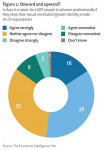Managing projects effectively is difficult even for experts, says new report
The report is based on a September 2009 survey of 213 senior executives and project management experts worldwide, supplemented by in-depth interviews and desk research. It focuses on six project-intensive industries: industrial manufacturing; architecture, engineering and construction; utilities, oil and gas; chemicals; aerospace and defence; and mining and metals.
Survey respondents are nearly unanimous in recognising the need for good project management: nearly 90% say it is important to delivering successful results and gaining a competitive edge. Yet little more than a third believe they are very good at project management.
This inconsistency has business implications. Many respondents say more than a quarter of their projects are late or above budget. One possible reason is that half of the organisations surveyed follow formal project management practices only on large or complex projects and only 20% use a standardised set of project management tools.
“The economic downturn has made it even more difficult for companies to execute their projects well,” says Katherine Dorr Abreu, senior editor at the Economist Intelligence Unit. “Without the necessary structure, resources and tools, project managers are hard put to meet goals now that budgets have shrunk and the pressure is on to cut costs and delivery times while also increasing quality.”
Other findings of the study include:
· Companies are aware of their shortcomings, but they are not sure how to address the problem. More than one-half of respondents (53%) say their companies are continually trying to improve their project management methods. Still, their efforts are often unfocussed and inconsistent. Only 45% plan to improve project management practices and apply them uniformly across all projects. A further 42% plan to standardise the use of project management tools to increase efficiency and collaboration.
Less than one-third (29%) plan to improve the way they measure qualitative and quantitative project outcomes; 29% plan to use better tools; and only 26% plan to increase training and certification. These numbers suggest that companies are not using all available methods to improve their project management.
· The worldwide economic slowdown may spur firms to action. The economic crisis has led to greater scrutiny of how projects are managed and has enhanced the perceived value of project management skills. This change in focus has led to a more structured and consistent application of project management practices across industries over the past two years.
Specifically, respondents are investing more time in project planning and due diligence (40%); conducting more frequent project reviews to assess risks, milestones and overall value (37%); and measuring results more frequently (38%). It is unclear whether this commitment will remain strong as the economy improves.
· The study reveals three areas that require improvement:
Every project management decision, from the choice of projects to the way teams measure results, should be linked to the strategic goals of the organisation.
Training, mentoring and other ways to improve project management skills should be carefully tied to specific skill gaps and overall career planning.
The success of a project is not solely a matter of meeting time and budget goals. To improve results, companies should determine whether the project helped their bottom line and should assess the satisfaction of clients and others with the project.
웹사이트: http://www.eiu.com
연락처
Joanne McKenna
+44 (0)20 7576 8188
이메일 보내기
이 보도자료는 Economist Intelligence Unit가(이) 작성해 뉴스와이어 서비스를 통해 배포한 뉴스입니다.




